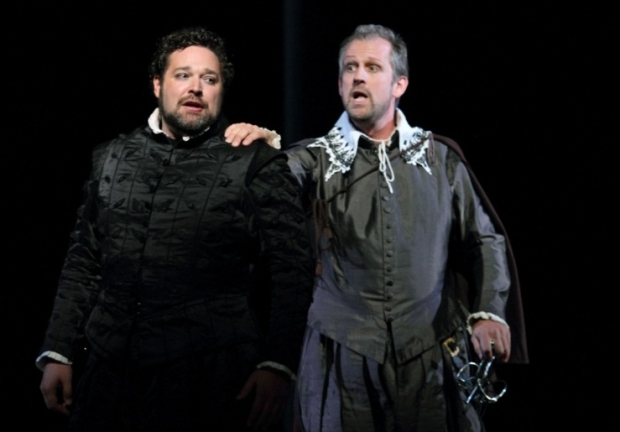Review: Don Carlo (Royal Opera House)
Verdi’s opera of love and politics returns in Nicholas Hytner’s production

© Catherine Ashmore
To many, it's Verdi's finest opera. It's certainly his longest, although there are almost as many different versions of Don Carlo (Don Carlos in its original French-language version) as there are hours in the day. The Royal Opera's choice represents Verdi's final thoughts, pretty much, and at five acts over four hours with no Parisian ballet it's all story.
It's an intimate tale of forbidden love in a turbulent political landscape. Don Carlo's problems begin when his father, King Philip II of Spain, decides to wed his son's beloved. Neither the prince (the 'Infante') nor his intended have any say in the matter, and the new status quo pleases no one. The King finds his new Queen cold and unresponsive, the Church sees devilry at every turn and the State, for historical reasons that the opera barely touches on, is at war with Flanders.
If Verdi had problems getting all his ducks in a row, it's not much easier for opera houses. On top of some extravagant technical resources they need an ace team of Verdi specialists to do it justice: one each of virtuoso soprano, mezzo-soprano, tenor, baritone and maestro, plus three basses and a crack chorus. This third incarnation of Nicholas Hytner's production is blest in some of these departments but by no means all.
Hytner has returned to oversee the revival, and he, designer Bob Crowley and lighting designer Mark Henderson have tinkered with the look of it – with mixed results. The much-derided red Duplo of the monastery garden has been repainted in black, happily, but the third act's burning of heretics has been toned down so radically that it now resembles a procession of the faithful. Flame-free and under-populated, it's more Palm Sunday than auto-da-fé.
'Always tasteful, often tranquil, rarely theatrical'
A couple of last-minute withdrawals from key roles have beset the show, so we should be grateful that the American soprano Kristin Lewis was able to step in and sing the heroine, Elisabeth de Valois. While not entirely satisfactory early on, perhaps on account of second-night nerves, her performance in the opera's great final scene earned sincere applause.
Another late jump-in, Christoph Pohl as Rodrigo, Marquis of Posa (the most level-headed character in the opera, albeit a slightly equivocal figure) was excellent: strong-voiced, sure-footed and an ideal vocal foil to Bryan Hymel in the title role. The pair's famous duet, a forerunner to the evergreen favourite from Bizet's Pearl Fishers, was notably stirring. After an aimless first 40 minutes it teed up the action to come.
As for Hymel, one of today's great heroic Italianate tenors, he sang with terrific élan but, in his role debut, insufficient subtlety. It was perfectly sound but one-dimensional. Next time, maybe.
Ekaterina Semenchuk sang the role of treacherous Princess Eboli with markedly less colour than she brought to the gypsy Azecuna in last year's Il trovatore, but her affecting scena of remorse more than made up for that. However, neither Ildar Abdrazakov as the King nor Paata Burchuladze as the Grand Inquisitor managed to efface fond memories of Ferruccio Furlanetto and Eric Halfvarson in previous incarnations of the production.
The evening's overriding disappointment was Bertrand de Billy's glossy approach to the score. Time and again he was guilty of conducting the notes rather than the drama. Always tasteful, often tranquil, rarely theatrical, it was characterless work from an experienced opera conductor.
Don Carlo runs in repertory at the Royal Opera House until 20 May.












